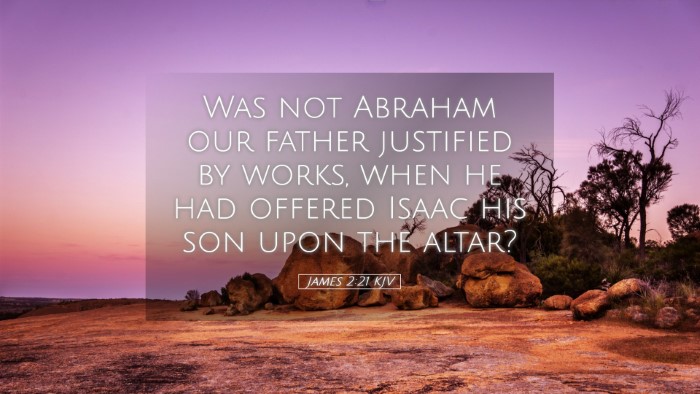Old Testament
Genesis Exodus Leviticus Numbers Deuteronomy Joshua Judges Ruth 1 Samuel 2 Samuel 1 Kings 2 Kings 1 Chronicles 2 Chronicles Ezra Nehemiah Esther Job Psalms Proverbs Ecclesiastes Song of Solomon Isaiah Jeremiah Lamentations Ezekiel Daniel Hosea Joel Amos Obadiah Jonah Micah Nahum Habakkuk Zephaniah Haggai Zechariah MalachiJames 2:21
James 2:21 KJV
Was not Abraham our father justified by works, when he had offered Isaac his son upon the altar?
James 2:21 Bible Commentary
Commentary on James 2:21
Verse: James 2:21
“Was not Abraham our father justified by works, when he had offered Isaac his son upon the altar?” (KJV)
Introduction
The epistle of James addresses critical themes of faith and works, with a focus on demonstrating the practical outworking of faith through actions. In James 2:21, the author references the patriarch Abraham to illustrate the relationship between faith and works, positing that true faith is evidenced by one's deeds. This commentary synthesizes insights from various public domain sources, offering a rich exploration of this verse.
Contextual Analysis
To understand James 2:21, we must consider the broader context of the epistle. James writes to a scattered Jewish audience facing trials and temptations, urging them to live out their faith authentically. The chapter deals with the peril of mere profession of faith unaccompanied by works, aiming to refute any notion that faith can exist in isolation from actions.
Faith and Works Defined
Both Matthew Henry and Albert Barnes emphasize that faith, when genuine, is not passive but active. Henry notes that a true faith is alive and operates through love, making manifest in the works of righteousness the believer performs. Barnes adds that works are necessary to demonstrate the authenticity of faith, illustrating that inner belief should invariably lead to outward action.
Exegesis of the Verse
James 2:21 cites Abraham as a foundational figure in demonstrating that faith is validated through action. This particular reference carries significant weight, as Abraham is revered in both Jewish and Christian traditions.
Abraham's Justification
Abraham’s moment of offering Isaac (Genesis 22) was pivotal. Adam Clarke elaborates on how this act of obedience exemplifies a profound trust in God. Abraham’s willingness to sacrifice his son was not merely a test of faith, but also the culmination of years of belief in God's promises. Thus, academics highlight that Abraham’s faith was not simply manifested in his belief; it culminated in definitive action. Clarke further suggests that this instance affirmed Abraham's faith as active, thereby justifying him through his works.
Justification and Works
In discussing justification, Barnes clarifies that James is not contravening the Pauline doctrine of justification by faith alone. Instead, James emphasizes that faith without works is dead (James 2:26). The Apostle Paul speaks of justification as based on faith without works (Romans 3:28), while James stresses the necessity of works as evidence of faith. This duality presents a holistic view of salvation—the belief that genuine faith will naturally produce obedience and good works.
Theological Implications
The theological ramifications of James 2:21 are profound and Multi-faceted. It necessitates a re-examination of how faith interacts with works within the life of the believer.
Role of Obedience
Henry insists that obedience is a crucial aspect of the believer's life, and without it, faith is rendered useless. The obedience of Abraham serves as a template for believers today, who are called to demonstrate their faith through tangible expressions of obedience to God's commands. Moreover, Adam Clarke warns against a static understanding of faith; the life of faith must be dynamic and produce visible results in the believer’s conduct.
Faith as Action
The concept of faith manifesting in action introduces a crucial dimension to Christian living. Albert Barnes notes that faith must actively express itself through love and good deeds, promising that true believers will inherently produce fruit befitting their faith. This perspective aligns with the teachings of Christ, wherein actions reflect the inner spiritual reality of the individual.
Practical Applications
Considering the implications of James 2:21, several practical applications emerge for contemporary believers:
- Self-Examination: Christians are encouraged to evaluate whether their faith is producing good works. They should ask themselves if their beliefs lead to affirmations of commitment in action.
- Faith in Action: Engaging in acts of service, compassion, and justice exemplifies the kind of faith that James advocates. Believers are called to reflect Christ in practical ways within their communities.
- Understanding Trials: In times of difficulty, believers should remember that their challenges can serve to strengthen both faith and works. Struggles can be opportunities for demonstrating resilience and reliance on God.
- Encouragement to Obey: Followers of Christ should take inspiration from Abraham's example, understanding the joy and necessity of obedience as a response to divine grace.
Conclusion
James 2:21 illustrates a fundamental theological truth: genuine faith will be evidenced through works. Abraham serves as a paradigmatic figure who embodies faith's active expression. This commentary has sought to intertwine insights from renowned public domain sources to provide a comprehensive understanding of the verse. For pastors, theologians, and students, the lesson is clear: faith should lead to an active display of obedience and works, thereby validating the authenticity of belief in the life of a believer.


